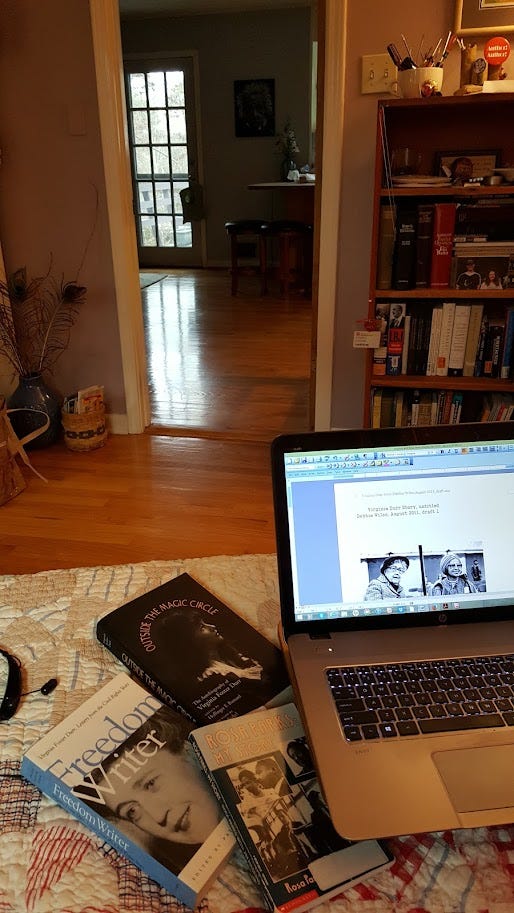
If you are just coming into the Lab, welcome! Thanks for subscribing! Don’t forget to introduce yourself here. We want to know you! And we want you to know us. If you haven’t seen the last two Lab posts about Mission Statements, you can find them here and here.
Happy Friday, Lab Coats! How did the week go? How is your Mission Statement coming along? I would love to hear. Some of y’all have sent me your mission statements, and I have loved chatting about them with you… keep going! Keep going! How does it feel? There is more… much more… stay tuned.
We’re spending our summer weeks with a Storybelly Summer Project, coming into and out of the Writers Lab as we can (or are so inclined), writing what amounts to (fancy words alert) a Mission Statement, a Vision Statement, Core Values, and Goals for our writing (yes, I snuck in goals, but really, they slide naturally onto our writing plates when we define why we do what we do, and how we want to show up in the writing world… and you’ll be surprised at how much more accurately your goals are specified and targeted (ugh, I need new words) when your mission and vision and values are clear.
You have a job to do:
“A writer is, by definition, a disturber of the peace.”
— James Baldwin
So, this summer work we’re doing is valuable work you can carry with you. It may be your own peace you disturb (Charlottesville has certainly done that for me, and so did Kent State), it may be the status quo, it may be any number of things, and the word “disturb” can be relative, yes? No matter your reasons for writing, CHANGE is part of the deal we make when we tell our stories. WE change. And that change takes courage. Best to have a mission clearly stated and a vision beautifully articulated, your sights set on the future.
We have limited time on this mortal coil, so it’s good to take some of it to create tangible parameters you can post somewhere and pull on when you feel yourself going off-course or when you just need some extra oomph, or a reminder (on bad/hard days especially) of why you do what you do.
Clarity, friends. These are tools for clarity. With them, you will always have focus and purpose alongside you for the writing ride. I recommend an ice cream sandwich as well. God knows so much of writing (for me anyway) is a muddle, as I try to figure out just what in the world I’m struggling to articulate on the page. At least I can know my general, overall reason for doing what I do. Which works to keep me at it, most days.
Now: Vision Statements.
A Vision Statement is the North Star of your writing practice. If you’ve been all over the place with your writing, even if you have a Mission Statement, you can rein in your wandering — your wandering with projects, ideas, possibilities, what-ifs, why-nots, notes-to-self and half-written (or rejected) stories — rein them in and help them work for you with a Vision Statement. Let your vision statement help deepen and enrich your mission.

The very best example of a Vision Statement I can think of today (possibly because I am working with Jefferson and Charlottesville so deeply right now inside my work in progress) is The Declaration of Independence. Yes, that declaration:
We hold these truths to be self-evident, that all men are created equal, that they are endowed by their Creator with certain unalienable Rights, that among these are Life, Liberty and the pursuit of Happiness.-
Yes, it’s long (the entire declaration). And yes, it is called a declaration and not a vision, but I submit it was written as a vision for young country called America, the United States of America, a vision this country is still struggling to live up to, and in that way it is most definitely a vision. A North Star.
Do take a moment to read it. (Okay, it will take longer than a moment.)
I find it fascinating that Abraham Lincoln, in his zeal to save the Union, looked to the The Declaration of Independence (as opposed to the US Constitution) as his guiding light when he was agonizing over how to present the Emancipation Proclamation to Americans and free the enslaved people of this country in 1863.
America had a vision in 1776. But I digress, for our purposes here. Let’s move on to the work at hand. YOU have a vision, too.




